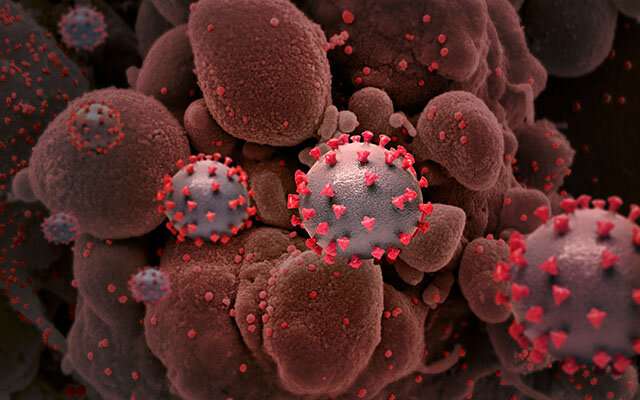Creative rendition of SARS-CoV-2 particles (not to scale). Credit: National Institute of Allergy and Infectious Diseases, NIH
A dramatic drop in testing for COVID-19 has left the world blind to the virus's continuing rampage and its potentially dangerous mutations, the World Health Organization warned Tuesday.
The UN health agency said that reported COVID cases and deaths had been dropping dramatically.
"Last week, just over 15 thousand deaths were reported to WHO—the lowest weekly total since March 2020," WHO chief Tedros Adhanom Ghebreyesus told reporters.
While this is "a very welcome trend," he warned that the declining numbers could also be a result of significant cuts in testing for the virus.
"This makes us increasingly blind to patterns of transmission and evolution," Tedros said.
"When it comes to a deadly virus, ignorance is not bliss."
William Rodriguez, who heads the global diagnostics alliance FIND, also decried that many governments in recent months simply stopped looking for COVID cases.
Speaking at the press conference hosted by WHO, he pointed out that in the past four months, amid surging COVID cases from the Omicron variant, "testing rates have plummeted by 70 to 90 percent worldwide."
The plunging testing rates came despite the fact that there is now more access to accurate testing than ever before.
"We have an unprecedented ability to know what is happening," Rodriguez pointed out.
"And yet today because testing has been the first casualty of a global decision to let down our guard, we're becoming blind to what is happening with this virus."
The COVID-19 pandemic has officially caused more than six million deaths since the virus first surfaced in China in late 2019, but the true toll is believed to be at least three times that high.
While many countries have been removing measures and trying to move back to a semblance of normality, the WHO stresses that the pandemic is still not over.
"This virus won't go away just because countries stop looking for it," Tedros said, pointing out that "it is still spreading, it is still changing, and it is still killing."
He cautioned that "the threat of a dangerous new variant remains very real."
"And although deaths are declining, we still don't understand the long-term consequences of infection in those who survive."
© 2022 AFP























